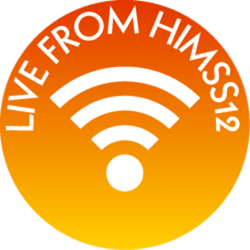It was fascinating to hear Biz Stone speak on Tuesday morning at HIMSS12. For one thing, the HIMSS Conference’s keynote speaker was quite different from what I’d expected. I suppose I was expecting another Mark Zuckerberg type—brilliant but also arrogant, and probably cool and superior as well. Instead, Biz Stone (born Christopher Isaac Stone), who will turn 37 next month, comes across as a laid-back California dude, though obviously extremely smart.
And his narrative of the creation and founding of Twitter was quite fascinating. As Stone explains it, he and another co-founder, Evan Williams (who along with Jack Dorsey and others had been working at Odeo), came up with the idea of connecting two disparate concepts—the “status message” alerts available to users of instant messaging services, and SMS-based text messaging, which by 2005 had already become popular in Europe.
Stone talked about how, as he and Williams and other colleagues began experimenting with this new concept, they were consistently told that what they were creating wasn’t useful; but, as Stone recalled for his HIMSS audience Tuesday morning, “I said to people, well, ice cream isn’t useful, either, but should we ban it??” So he and his colleague persevered, and then, during the October 2007 South By Southwest music , film and arts festival held in Austin, Texas, Stone and Williams suddenly saw a tipping point occur, when SXSW attendees began to tweet (the Twitter founders had been promoting their new service at the festival) with great intensity, causing people to move from one venue (whether a lecture or a social gathering in a pub) to another seemingly like flocks of birds. Stone told the HIMSS audience he was astounded by the phenomenon, and the next day, he and Williams officially incorporated Twitter—and the rest, as they say, is history.
Touching on the geosocial implications of the use of social media, Stone said with some modesty that it’s important to remember that information is not knowledge or understanding, but can lead to the knowledge or understanding that then leads to action. He cited the Arab spring of 2011, when people across the Middle East rose up against dictatorial regimes, leveraging social media to communicate with one another and to take action. To his credit, Stone did not in any way imply that Twitter (or for that matter, Facebook, etc.) was a cause of any actions; rather, he underscored his belief that “it’s not about the technology, it’s about the people.”
In contrast to so many keynote speakers one has heard at so many conferences, it must be said that Stone’s approach to his keynote address Tuesday morning was refreshing and thought-provoking. And he struck precisely the right tone when he told HIMSS12 attendees that he saluted them for being a part of a broader effort to leverage technology to help people and improve health. A good start, I think, for the days ahead of presentations, discussions, and other interactions that inevitably will get “into the weeds” on all the issues facing the HIMSS12 audience going forward.



